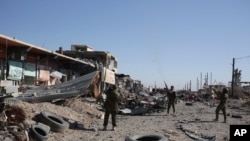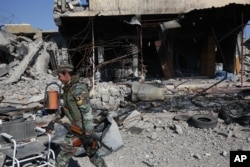Facing a massive financial shortfall, Kurdish authorities in Iraq sought emergency economic assistance last year from Iran, according to Kurdish and Iranian sources.
The discussion stalled, the sources said, because Tehran demanded a share of Kurdish oil revenues.
Nazim Dabakh, the Kurdish region's representative to Iran, told VOA that the subject was discussed during the visit of Kurdish Prime Minister Nechirvan Barzani to Tehran during the Munich Security Conference in October.
Dabakh said that "through our channels and in our private meeting with Iranian officials, we have conveyed the message of Kurdish people about the financial crisis and our need for assistance. The Islamic Republic of Iran showed its willingness to provide the Kurdistan regional government a large amount of money in loans via its companies operating in Kurdistan in exchange for our government paying back in oil."
Both sides agreed to discuss the details of the proposal in another meeting in the Kurdish region's capital of Irbil, he told VOA. Several high-ranking Kurdish officials contacted by VOA, including the deputy prime minister, declined to comment.
Oil price decline
A pro-Western region and one of the most effective allies in fighting the Islamic State group, the Kurdish region is wrestling with a financial crisis triggered by the fall in oil prices, a costly war against IS and the influx of about 1.8 million refugees from Iraq and Syria.
Kurdish officials estimate their authority has piled up $15 billion to $18 billion in debt.
"The Iranians agreed to give $50 million in the form of microloans, as a first phase, in exchange for some cooperation on oil derivatives and refineries of the region," a former Iranian Revolutionary Guards member told VOA on condition of anonymity.
Desperate for cash, a high-level delegation of Kurds, representing the Kurdish government, made a similar appeal to the United States for urgent help earlier this year during an official visit to Washington.
The Kurds warned that the crisis might affect the morale of their fighters who are pushing toward the IS stronghold in Iraq, Mosul, despite not receiving payment for months.
The U.S. government has taken their pleas seriously and proposed providing $50 million per month to pay their forces, according to a report last week in the journal Foreign Policy.
Iranian help in 2014
The Kurdish authority has friendly relations with Iran. When IS attacked Irbil in 2014, Iran delivered arms and ammunition to the Kurdish forces. The U.S. military later provided aerial cover for that Kurdish operation.
"We asked for weapons, and Iran was the first country to provide us with weapons and ammunition," Kurdish leader Masoud Barzani said at a joint news conference with Iranian Foreign Minister Mohammad Javad Zarif in August 2014.
"The emergence of IS has clearly allowed Iran to expand its influence in Kurdistan," Perry Cammack, an associate at the Carnegie Endowment's Middle East Program, told VOA. "Iran seeks to deepen ties with the Kurds in Iraq and Syria, who play a major role in fighting against IS."
Last month, Iranian officials were on hand to open the Khomeini Cultural and Sports Center in the Kurdish city of Kirkuk, to coincide with the 37th anniversary of Iran's 1979 Islamic Revolution.
VOA's Mehdi Jedinia contributed to this report.













